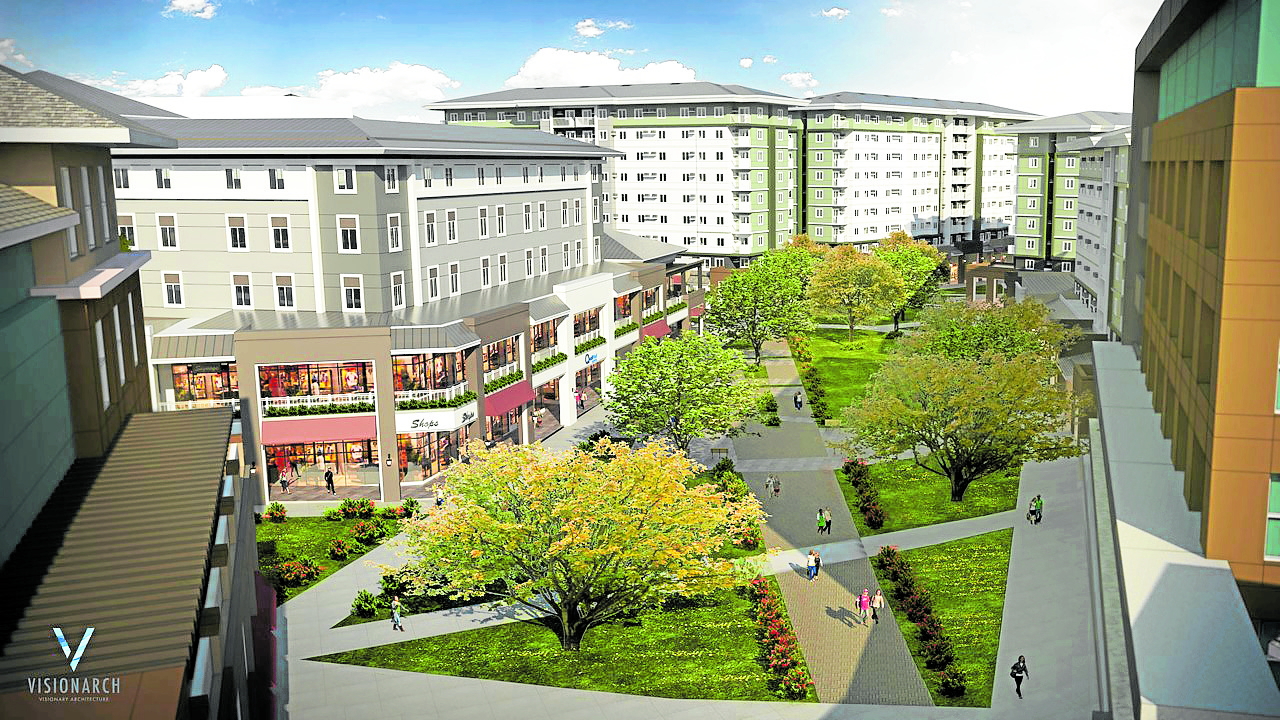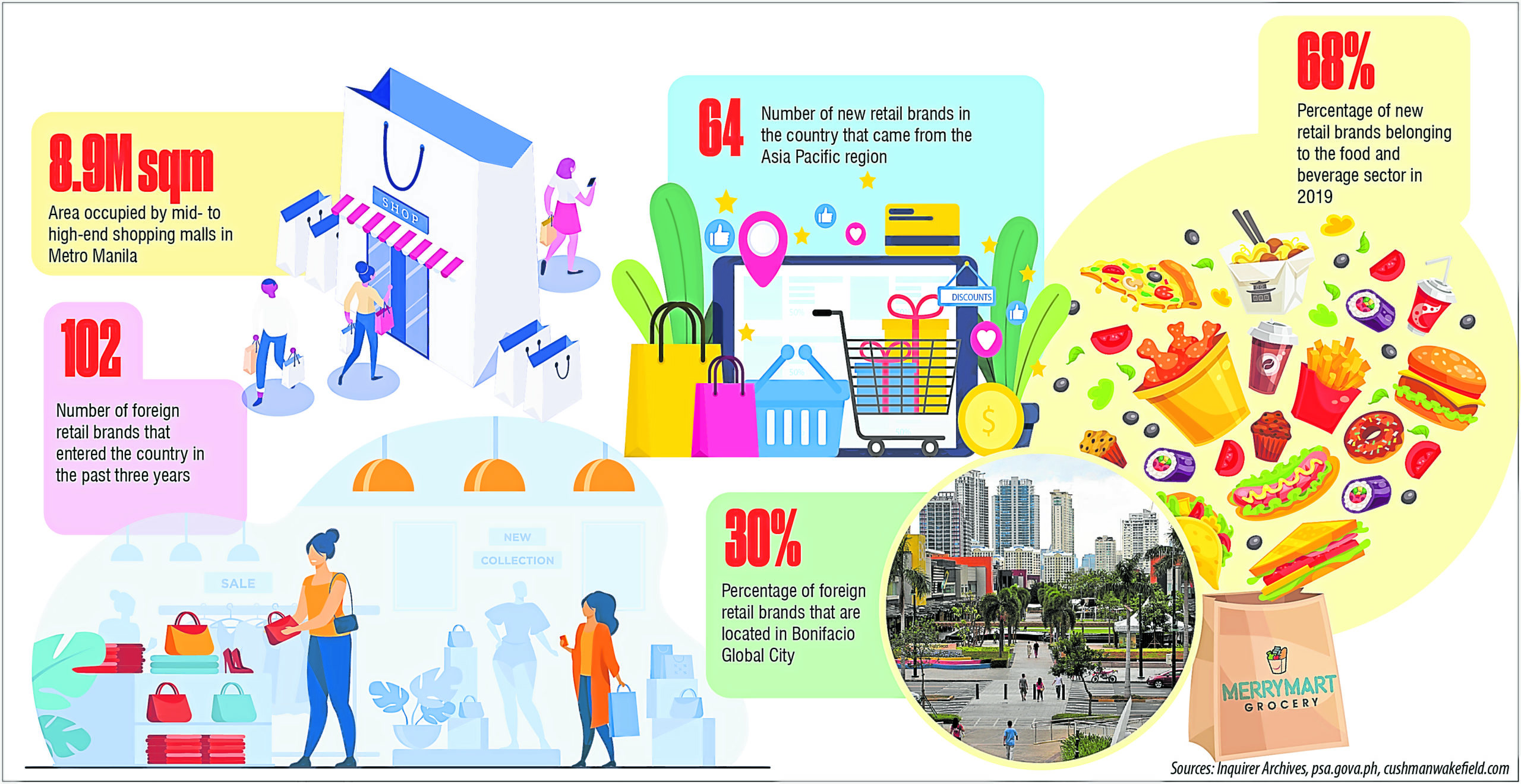An evolving PH retail landscape
The retail landscape in the Philippines has consistently grown and flourished in recent years, even as the brick-and-mortar stores abroad are being rendered obsolete due to a growing preference for online shopping.
Primarily it’s because the mall culture is very much ingrained in the Filipino lifestyle as shopping centers also serve as community centers, where citizens can conduct many aspects of their everyday business.
Focus market
The Philippines has been regarded by global retail brands as one of the key focus markets within the Asia Pacific region. Over the past three years, a total of 102 new foreign brands entered the Philippines, 68 of which opened between 2017 and 2018 and an additional 34 brands opened during the period of January to November 2019, according to the report “How Global Brands are Shaping the Metro Manila Retailer Landscape” by international real estate services firm Cushman & Wakefield.
As for existing foreign retailers, the report further said that these brands took advantage of the country’s “upbeat retail sector” by actively expanding, given that the number of shopping malls here also continues to grow. In terms of space, mid- to high-end shopping malls in Metro Manila have occupied 8.9 million square meters as of end of 2019. Quezon City, with a population of 2.9 million, has the largest share of the existing supply. By 2022, shopping mall space in Metro Manila is expected to reach 9.8 million sqm, with major expansions happening in the Bay Area, which spans across the cities of Manila, Pasay and Parañaque, the report stated.
The incessant addition of retail space is just one reason why the Philippines is defying the “retail apocalypse” happening elsewhere, especially in the United States where, according to the report, almost 6,000 stores closed two years ago.

In terms of space, mid- to high-end shopping malls in Metro Manila have occupied 8.9 million sqm as of end of 2019.
Online presence
Admittedly, however, the COVID-19 pandemic affected all businesses and industries globally, on varying degrees. Some sectors reeled from the challenges of the pandemic, forcing permanent business closures and work stoppages, while others proved to be relatively resilient, such as the retailers of basic goods and food manufacturers. This had prompted many retailers to expand their online presence to reach more customers amid the COVID-19 pandemic and the stringent lockdowns.
Article continues after this advertisementIn May, Colliers International Philippines had said that it expected more retailers to create their own e-commerce sites, utilize existing sites of major mall operators, or use popular social media platforms such as Facebook and Instagram. Given this changing retail landscape because of the pandemic, the popularity of e-commerce is inevitable.
Article continues after this advertisementMeanwhile, Cushman & Wakefield had highlighted the need for companies to have a digital strategy in place. In this regard, the report recommends that brands go for omni-channel retailing—a system which integrates seamlessly the online and offline retail experience.
“Omni-channel retailing works on the idea that consumers browse and compare products before making a purchase. Whereas its main goal is to improve physical store experience with the digital exposure, it starts even before the customers visit the store. [It] is triggered when the customers reach the brand’s website. Based on [their] interaction on the website, their digital footprints are immediately evaluated,” the report explained.
“The customers are then re-targeted after leaving the website and upon their transition from one channel to another, even though they have not made any purchase yet. [They] will then be shown personalized ads and promotions. The strategy … eventually refers customers to nearby brick-and-mortar stores,” it further stated.
Innovations in retail
Over the years, property developers have rolled out new measures and changes to ensure the sustainability of their malls and commercial spaces and consequently, of their locators or tenants–even long before the COVID-19 outbreak. Take the case of Ayala Land, whose integrated estates have allowed its commercial spaces to continue thriving, providing the essentials amid a highly challenging period. As Ayala Land estates have seamlessly woven a healthy, diverse mix of uses within a single, self-contained community, each component is able to support the others. In today’s case, the commercial spaces in these estates thrived because it served as a crucial lifeline for residents who needed access to essential goods and services. In turn, these ensured the sustainability of businesses within the community.
Retail landscape is also shaped by innovations by enterprising retailers. DoubleDragon Properties made this effort in bringing its chain of small community centers, CityMall, to tertiary cities, instead of going the usual route of setting up in urban centers. Majority of the tenants of these community centers offer the basics and essentials like a supermarket, pharmacy, food, clinic, banks and money remittance centers, making its presence a vital role in serving communities across various provinces.
As for its supermarket chain, MerryMart comes in three formats: full-size MerryMart Grocery; MerryMart Market, which houses more specialized products; and the MerryMart Store, which offers a three-in-one concept combining a mini-grocery, personal care shop and pharmacy.
DoubleDragon is also planning to launch a drive-thru MerryMart in response to the changing preferences and landscape amid the COVID-19 pandemic. The first MerryMart drive thru is currently in the works and is targeted to start operations in Iloilo City by next year.
DoubleDragon further aims to build CentralHub warehouse complexes in 81 provinces over the next few years. Demand for modern industrial warehouses are expected to increase in the coming years as e-commerce and consumer companies expand nationwide.
Sources: Inquirer Archives, Cushman & Wakefield

